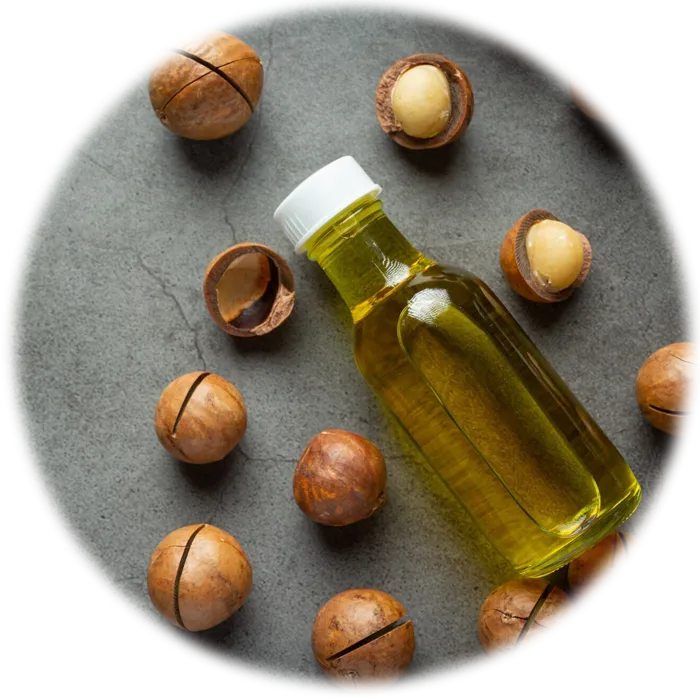
Nutritional properties of Macadamia Oil
Energy :
884.00 Kcal / 100g
Category : Oils and Fats
Group : Vegetable Oils & Fats
Composition And Nutritional Value :Macadamia oil is extracted from the nuts of the macadamia tree and is rich in monounsaturated fats, particularly oleic acid (omega-9), which is beneficial for heart health. It also contains a smaller amount of polyunsaturated fats, including omega-6 fatty acids (linoleic acid), and a minimal amount of saturated fats. Macadamia oil is a good source of antioxidants, such as vitamin E (tocopherols and tocotrienols), which help protect cells from oxidative damage. It also contains palmitoleic acid, a rare omega-7 fatty acid that has anti-inflammatory properties and supports healthy skin. Additionally, macadamia oil is a source of essential fatty acids that contribute to overall health and well-being.
Health Benefits : Macadamia oil offers several health benefits due to its high content of monounsaturated fats, which can help reduce LDL (bad) cholesterol levels and lower the risk of heart disease. The oil’s antioxidant content, particularly vitamin E, helps protect cells from oxidative damage and reduces inflammation. The omega-7 fatty acid (palmitoleic acid) found in macadamia oil has been shown to support skin health by promoting hydration and improving skin elasticity. The oil is also known to improve brain function, regulate blood sugar levels, and support the health of the digestive system. Due to its anti-inflammatory properties, it can also benefit conditions like arthritis and skin irritation.
Culinary Uses : Macadamia oil has a mild, buttery flavor and a high smoke point (about 410°F or 210°C), making it suitable for a variety of cooking methods. It can be used for frying, sautéing, grilling, and roasting without breaking down or losing flavor. The oil's rich taste makes it an excellent addition to dressings, marinades, and sauces. It can also be used as a finishing oil for drizzling over vegetables, pasta, or salads. Due to its smooth texture and flavor, macadamia oil is also commonly used in baking, especially for cakes, cookies, and other light pastries.
Types : Macadamia oil is available in both refined and unrefined varieties. Unrefined (cold-pressed) macadamia oil retains its natural nutrients, antioxidants, and flavor, making it ideal for salad dressings, finishing dishes, or cosmetic applications. Refined macadamia oil, on the other hand, has a milder flavor and higher smoke point, making it suitable for high-heat cooking, such as frying and sautéing. When purchasing macadamia oil, look for cold-pressed, unrefined oil for the best health benefits and flavor, especially if you are using it for raw or low-heat applications.
Shopping And Storage Tips : When buying macadamia oil, choose cold-pressed or expeller-pressed varieties for the highest quality and most nutrient-rich oil. Store macadamia oil in a cool, dark place to prevent oxidation and maintain its freshness. It is best to keep it in a dark glass bottle to protect it from light, which can degrade the oil. Macadamia oil has a relatively long shelf life, but it is recommended to use it within 12-18 months after opening to ensure optimal freshness. If the oil develops an off odor or taste, it may have gone rancid and should be discarded.

